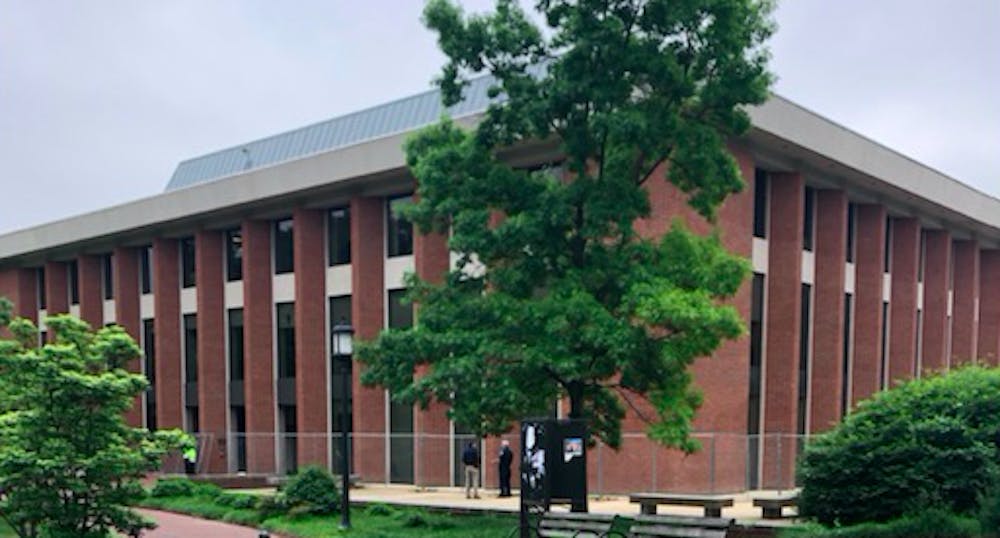Editor’s Note: This is a developing story and will be updated as more information becomes available.
Baltimore Police officers arrested seven people — including four students — who were part of a month-long sit-in at Garland Hall on Wednesday morning. Students and community members have been holding a sit-in at Garland Hall to protest the creation of a private police force and the University’s contracts with Immigration and Customs Enforcement since April 3.
At around 11 a.m., a spokesperson for the Baltimore City State's Attorney Office announced that the office will not prosecute those arrested. Later on Wednesday afternoon, those arrested were released from Central Booking and Intake Center without charges or bail.
Police said they arrested five of the protesters for trespassing and two others for impeding vehicle traffic. Among those arrested were undergraduates Reshmi Patel and Agatha Gilman and graduate students Marios Falaris and Mariam Banahi.
Earlier Wednesday morning, administrators had called on the Baltimore Police Department and the Baltimore City Fire Department at 4:51 a.m. to evict students from the building and re-open Garland Hall. The University had closed down Garland on May 1 after organizers escalated their tactics, chaining the doors shut and chaining themselves to the building’s stairwells.
According to The Baltimore Sun, 80 police officers arrived outside Garland Hall to vacate protesters from the building, offering amnesty to those who willingly left the sit-in. When students refused to leave, police officers began making arrests.
As the arrests were made, two of the protesters lay down by the vans. According to The Baltimore Sun and Baltimore Brew, police officers misgendered a transgender woman they arrested and tried to force her into a van for male-identifying people. In opposing the planned private police force, students have often argued that police pose an especial threat to LGBTQ students, as well as students of color and students with disabilities.
In a university-wide email sent at 9:08 a.m., University President Ronald J. Daniels and Provost Sunil Kumar explained their decision to summon local fire and police personnel.
“What began as a demonstration against university policies in recent days took a turn, as students and outside activists chained the doors closed, blocked exits and entrances to the building, harassed and intimidated our staff, and physically prevented fellow students from receiving essential services. This was no longer a peaceful show of civil disobedience, but instead a forcible occupation of a university building in contravention of the law and university code of conduct,” they wrote.
They also reiterated that they had made efforts to meet with students and negotiate with them and that they have not been cooperative in the process.
“In the intervening days, we worked around the clock to bring the occupation to a constructive conclusion. We made open-ended offers to meet and provide amnesty to our students. We also undertook an intensive effort to communicate with student protesters, directly and through their families, friends, and mentors,” they wrote. “While some student protesters were receptive to these overtures; others regrettably were not.”
However, since Garland Hall shut down, administrators and organizers have been exchanging emails to arrange a meeting time for negotiations. This past Sunday, administrators emailed organizers of the sit-in proposing a live-streamed meeting at FastForward U for Monday at 9:30 a.m, inviting student protesters who willingly left or were willing to leave the occupation.
Protesters did not attend the meeting, explaining in an email sent at 5 p.m. on Monday that University officials had not given them enough time to respond collectively as a group. In the same email, organizers also requested that administrators not call upon law enforcement and to grant academic, professional and legal amnesty to all participants.
At 12:19 a.m. on Wednesday, organizers sent a follow-up email reiterating these demands to administrators listing possible dates and times for negotiations.
“We reiterate our commitment to an expedited negotiation. We look forward to meeting with you and working towards a safe resolution for all parties involved,” they wrote.
Outgoing Student Government Association Executive President AJ Tsang wrote in an email to The News-Letter that he was surprised by the timing of the arrests, given recent correspondence between students and administrators.
“In the twenty-four hours leading up to the police operation, I felt that peaceful negotiations were imminent and that both sides were on the verge of scheduling a time to meet,” he wrote.
Tsang said that it may also have been possible that the administrators were concerned about the safety of students, noting that organizers had posted that white supremacists were attempting to enter Garland Hall on the JHU Sit-In Facebook page shortly before the arrests.
“Nevertheless, I truly wish the sit-in and following occupation could have ended with a conversation and dialogue, not a police operation,” he wrote.
Sophomore Class Senator Sam Mollin wrote in an email to The News-Letter that he does not believe that administrators were sincere in wanting to negotiate with students.
“Sending in police makes it seem to me like the University never had any intention to hold good faith negotiations in which they would actually attempt to compromise with the protestors,” he wrote. “Based off of this, the protestors were right to refuse the proposed short-notice meeting, and administration was clearly afraid of any actual, even-ground negotiations with students just trying to make their voices heard.”
After the arrests, organizers held a press conference at 8:30 a.m. on campus. At the press conference, junior Karter James Burnett said that the arrests were not going to stop students from organizing.
“This rally, this protest and this movement will continue with or without Johns Hopkins’ support,” Burnett said.
University administrators and members of the JHU Garland Occupation did not respond by the time of publication.
Rachel Juieng contributed reporting. Rudy Malcom has written an Opinions piece on the sit-in. He did not contribute writing or reporting to this piece.





